

Zoroastrianism. Zoroastrianism,[n 1] or more natively Mazdayasna, is one of the world's oldest extant religions, "combining a cosmogonic dualism and eschatological monotheism in a manner unique [...] among the major religions of the world".[1] Ascribed to the teachings of the Iranian-speaking prophet Zoroaster (also known as Zarathustra),[2] it exalts a deity of wisdom, Ahura Mazda (Wise Lord), as its Supreme Being.[3] Major features of Zoroastrianism, such as messianism, judgment after death, heaven and hell, and free will have influenced other religious systems, including Second Temple Judaism, Gnosticism, Christianity, and Islam.[4] Following the Iranian Revolution and the arrival of the Islamic theocracy in Iran, Zoroastrianism/Mazdayasna is having a strong revival amongst many Iranians who want to express discontent towards the dictatorial theocratic regime.
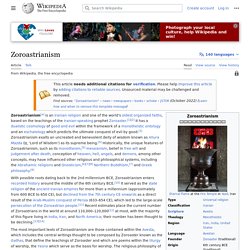
Terminology The name Zoroaster is a Greek rendering of the name Zarathustra. Overview Theology Practices History Classical antiquity Late antiquity. Zoroaster. Zoroaster (/ˌzɒroʊˈæstər/ or /ˈzɒroʊˌæstər/, from Greek Ζωροάστρης Zōroastrēs), also known as Zarathustra (/ˌzɑrəˈθuːstrə/; Avestan: 𐬰𐬀𐬭𐬀𐬚𐬎𐬱𐬙𐬭𐬀 Zaraθuštra; Persian: زرتشت Zartosht, زردشت Zardosht), was the founder of Zoroastrianism.
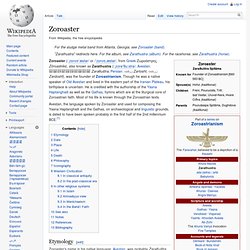
Though he was a native speaker of Old Avestan and lived in the eastern part of the Iranian Plateau, his birthplace is uncertain. He is credited with the authorship of the Yasna Haptanghaiti as well as the Gathas, hymns which are at the liturgical core of Zoroastrian faith. Most of his life is known through the Zoroastrian texts. Avestan, the language spoken by Zoroaster and used for composing the Yasna Haptanghaiti and the Gathas, on archaeological and linguistic grounds, is dated to have been spoken probably in the first half of the 2nd millennium BCE.[1] Etymology[edit] Following *Zarantuštra- are: "with old/aging camels":[3] related to Avestic zarant-.[2] (cf.
Following *Zaratuštra- are: Date[edit] Place[edit] Ahura Mazda. Ahura Mazda (/əˌhʊrəˌmæzdə/;[1]), (also known as Ohrmazd, Ahuramazda, Hourmazd, Hormazd, and Hurmuz, Lord or simply as spirit) is the Avestan name for a higher spirit of the Old Iranian religion who was proclaimed as the uncreated spirit by Zoroaster, the founder of Zoroastrianism.
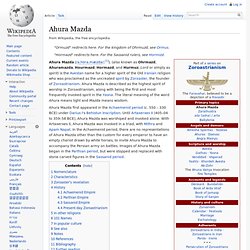
Ahura Mazda is described as the highest spirit of worship in Zoroastrianism, along with being the first and most frequently invoked spirit in the Yasna. The literal meaning of the word Ahura means light and Mazda means wisdom. Ahura Mazda first appeared in the Achaemenid period (c. 550 – 330 BCE) under Darius I's Behistun Inscription.
Until Artaxerxes II (405–04 to 359–58 BCE), Ahura Mazda was worshiped and invoked alone. With Artaxerxes II, Ahura Mazda was invoked in a triad, with Mithra and Apam Napat. Avesta. The Avesta /əˈvɛstə/ is the primary collection of sacred texts of Zoroastrianism, and is composed in the Avestan language.
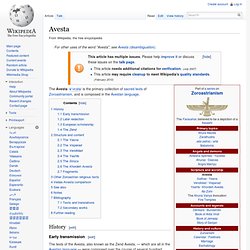
History[edit] Early transmission[edit] The texts of the Avesta, also known as the Zend Avesta, — which are all in the Avestan language — were composed over the course of several hundred years. The most important portion, the Gathas, in older (before the works of Johanna Narten 'Gathic') Avestan, are the hymns thought to have been composed by Zoroaster himself. The liturgical texts of the Yasna, which includes the Gathas, is in Older Avestan, with short, later additions in Younger Avestan. Young Avesta's area of composition comprised - at least - Sīstān/Arachosia, Herat, Merv and Bactria.[2] It went through the following stages:[3] The original language of the composers of grammatically correct YAv. texts; perhaps in Merv or Herat;Dialect influences as a result of the transfer of the Av. texts to Southeast Iran (Arachosia?)
Later redaction[edit] European scholarship[edit] Gathas. This article is about the sacred hymns of Zarathushtra.
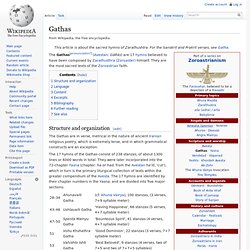
For the Sanskrit and Prakrit verses, see Gatha. The Gathas[pronunciation?] (Avestan: Gāθās) are 17 hymns believed to have been composed by Zarathusthra (Zoroaster) himself. They are the most sacred texts of the Zoroastrian faith. Structure and organization[edit] The Gathas are in verse, metrical in the nature of ancient Iranian religious poetry, which is extremely terse, and in which grammatical constructs are an exception. Zoroastrian Archives.